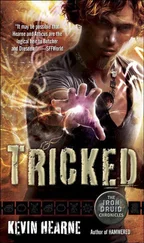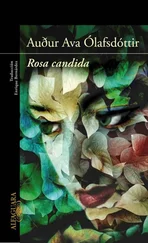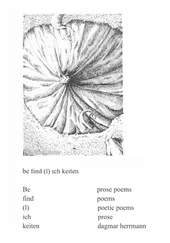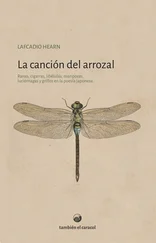"We have been very anxious about you, friend Hoichi. To go out, blind and alone, at so late an hour, is dangerous. Why did you go without telling us? I could have ordered a servant to accompany you. And where have you been?"
Hoichi answered, evasively,—
"Pardon me kind friend! I had to attend to some private business; and I could not arrange the matter at any other hour."
The priest was surprised, rather than pained, by Hoichi's reticence: he felt it to be unnatural, and suspected something wrong. He feared that the blind lad had been bewitched or deluded by some evil spirits. He did not ask any more questions; but he privately instructed the men-servants of the temple to keep watch upon Hoichi's movements, and to follow him in case that he should again leave the temple after dark.
On the very next night, Hoichi was seen to leave the temple; and the servants immediately lighted their lanterns, and followed after him. But it was a rainy night, and very dark; and before the temple-folks could get to the roadway, Hoichi had disappeared. Evidently he had walked very fast,—a strange thing, considering his blindness; for the road was in a bad condition. The men hurried through the streets, making inquiries at every house which Hoichi was accustomed to visit; but nobody could give them any news of him. At last, as they were returning to the temple by way of the shore, they were startled by the sound of a biwa, furiously played, in the cemetery of the Amidaji. Except for some ghostly fires—such as usually flitted there on dark nights—all was blackness in that direction. But the men at once hastened to the cemetery; and there, by the help of their lanterns, they discovered Hoichi,—sitting alone in the rain before the memorial tomb of Antoku Tenno, making his biwa resound, and loudly chanting the chant of the battle of Dan-no-ura. And behind him, and about him, and everywhere above the tombs, the fires of the dead were burning, like candles. Never before had so great a host of Oni-bi appeared in the sight of mortal man...
"Hoichi San!—Hoichi San!" the servants cried,—"you are bewitched!... Hoichi San!"
But the blind man did not seem to hear. Strenuously he made his biwa to rattle and ring and clang;—more and more wildly he chanted the chant of the battle of Dan-no-ura. They caught hold of him;—they shouted into his ear,—
"Hoichi San!—Hoichi San!—come home with us at once!"
Reprovingly he spoke to them:—
"To interrupt me in such a manner, before this august assembly, will not be tolerated."
Whereat, in spite of the weirdness of the thing, the servants could not help laughing. Sure that he had been bewitched, they now seized him, and pulled him up on his feet, and by main force hurried him back to the temple,—where he was immediately relieved of his wet clothes, by order of the priest. Then the priest insisted upon a full explanation of his friend's astonishing behavior.
Hoichi long hesitated to speak. But at last, finding that his conduct had really alarmed and angered the good priest, he decided to abandon his reserve; and he related everything that had happened from the time of first visit of the samurai.
The priest said:—
"Hoichi, my poor friend, you are now in great danger! How unfortunate that you did not tell me all this before! Your wonderful skill in music has indeed brought you into strange trouble. By this time you must be aware that you have not been visiting any house whatever, but have been passing your nights in the cemetery, among the tombs of the Heike;—and it was before the memorial-tomb of Antoku Tenno that our people to-night found you, sitting in the rain. All that you have been imagining was illusion—except the calling of the dead. By once obeying them, you have put yourself in their power. If you obey them again, after what has already occurred, they will tear you in pieces. But they would have destroyed you, sooner or later, in any event... Now I shall not be able to remain with you to-night: I am called away to perform another service. But, before I go, it will be necessary to protect your body by writing holy texts upon it."
Before sundown the priest and his acolyte stripped Hoichi: then, with their writing-brushes, they traced upon his breast and back, head and face and neck, limbs and hands and feet,—even upon the soles of his feet, and upon all parts of his body,—the text of the holy sutra called Hannya-Shin-Kyo. (7) When this had been done, the priest instructed Hoichi, saying:—
"To-night, as soon as I go away, you must seat yourself on the verandah, and wait. You will be called. But, whatever may happen, do not answer, and do not move. Say nothing and sit still—as if meditating. If you stir, or make any noise, you will be torn asunder. Do not get frightened; and do not think of calling for help—because no help could save you. If you do exactly as I tell you, the danger will pass, and you will have nothing more to fear."
After dark the priest and the acolyte went away; and Hoichi seated himself on the verandah, according to the instructions given him. He laid his biwa on the planking beside him, and, assuming the attitude of meditation, remained quite still,—taking care not to cough, or to breathe audibly. For hours he stayed thus.
Then, from the roadway, he heard the steps coming. They passed the gate, crossed the garden, approached the verandah, stopped—directly in front of him.
"Hoichi!" the deep voice called. But the blind man held his breath, and sat motionless.
"Hoichi!" grimly called the voice a second time. Then a third time—savagely:—
"Hoichi!"
Hoichi remained as still as a stone,—and the voice grumbled:—
"No answer!—that won't do!... Must see where the fellow is."...
There was a noise of heavy feet mounting upon the verandah. The feet approached deliberately,—halted beside him. Then, for long minutes,—during which Hoichi felt his whole body shake to the beating of his heart,—there was dead silence.
At last the gruff voice muttered close to him:—
"Here is the biwa; but of the biwa-player I see—only two ears!... So that explains why he did not answer: he had no mouth to answer with—there is nothing left of him but his ears... Now to my lord those ears I will take—in proof that the august commands have been obeyed, so far as was possible"...
At that instant Hoichi felt his ears gripped by fingers of iron, and torn off! Great as the pain was, he gave no cry. The heavy footfalls receded along the verandah,—descended into the garden,—passed out to the roadway,—ceased. From either side of his head, the blind man felt a thick warm trickling; but he dared not lift his hands...
Before sunrise the priest came back. He hastened at once to the verandah in the rear, stepped and slipped upon something clammy, and uttered a cry of horror;—for he saw, by the light of his lantern, that the clamminess was blood. But he perceived Hoichi sitting there, in the attitude of meditation—with the blood still oozing from his wounds.
"My poor Hoichi!" cried the startled priest,—"what is this?... You have been hurt?"
At the sound of his friend's voice, the blind man felt safe. He burst out sobbing, and tearfully told his adventure of the night.
"Poor, poor Hoichi!" the priest exclaimed,—"all my fault!—my very grievous fault!... Everywhere upon your body the holy texts had been written—except upon your ears! I trusted my acolyte to do that part of the work; and it was very, very wrong of me not to have made sure that he had done it!... Well, the matter cannot now be helped;—we can only try to heal your hurts as soon as possible... Cheer up, friend!—the danger is now well over. You will never again be troubled by those visitors."
With the aid of a good doctor, Hoichi soon recovered from his injuries. The story of his strange adventure spread far and wide, and soon made him famous. Many noble persons went to Akamagaseki to hear him recite; and large presents of money were given to him,—so that he became a wealthy man... But from the time of his adventure, he was known only by the appellation of Mimi-nashi-Hoichi: "Hoichi-the-Earless."
Читать дальше











